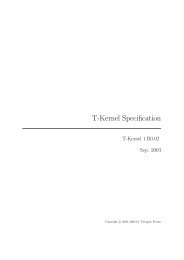[8] 2002 e-business-strategies-for-virtual-organizations
[8] 2002 e-business-strategies-for-virtual-organizations
[8] 2002 e-business-strategies-for-virtual-organizations
You also want an ePaper? Increase the reach of your titles
YUMPU automatically turns print PDFs into web optimized ePapers that Google loves.
Developing knowledge-based <strong>strategies</strong> <strong>for</strong> a <strong>virtual</strong> organization<br />
7.12 Summary<br />
The <strong>virtual</strong> organization is recognized as a dynamic <strong>for</strong>m of<br />
interorganizational systems and hence one where traditional<br />
hierarchical <strong>for</strong>ms of management and control may not apply.<br />
Little, however, has been written about the new <strong>for</strong>ms which<br />
management and control might take other than to espouse a<br />
‘knowledge management’ approach. We are entitled to ask –<br />
managing knowledge about what?<br />
In an organization where change is the only constant, then there<br />
has to be a system that can capture the organizational core<br />
competencies and leverage these to provide strategic advantage.<br />
This may be a competitive advantage or a strategic advantage in<br />
collaboration with the competition.<br />
Knowledge has become the major asset of the organization.<br />
Consequently its recording, communication and management<br />
deserve attention. Without the ability to identify who has the<br />
key in<strong>for</strong>mation, who the experts are, and who needs to be<br />
consulted, management decisions are unlikely to be as good as<br />
they could be even if they are not completely wrong. Both the<br />
importance and the difficulty of the issue are magnified by the<br />
changing nature of the firm itself. We see on every hand that<br />
change – most frequently incorporating aspects of <strong>virtual</strong>ity – is<br />
occurring daily in every industry. We see the move in every<br />
industry toward larger companies and <strong>organizations</strong>, decentralization<br />
and dispersion, empowerment and continual change. In<br />
the resulting complex interdependent <strong>organizations</strong>, the synergy<br />
of knowledge might be the principal benefit of this<br />
interdependence and so the issue is magnified further.<br />
More conscious ef<strong>for</strong>ts and explicit procedures are needed in<br />
dispersed <strong>organizations</strong>. Skills may not be available where they are<br />
wanted, data might not be shared or they might be used<br />
inefficiently or wrongly. New skills need to be developed quickly<br />
and employees will have to take personal responsibility <strong>for</strong> their<br />
own knowledge development. This implies that the <strong>virtual</strong><br />
organization will need a number of managers with converging<br />
expertise in the areas identified within the <strong>virtual</strong> organizing<br />
change management model (Figure 7.4). There may no longer be<br />
a separate ICT or knowledge management function. Indeed there<br />
may no longer be any management function that does not<br />
explicitly demand expertise in these areas.<br />
The implications <strong>for</strong> you, as IS professionals, are quite frightening.<br />
Whole areas of new skills need to be acquired and these<br />
165


![[8] 2002 e-business-strategies-for-virtual-organizations](https://img.yumpu.com/8167654/184/500x640/8-2002-e-business-strategies-for-virtual-organizations.jpg)












